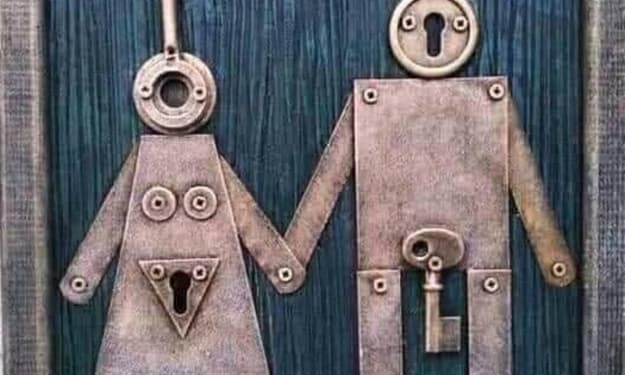The Vacationers
Parts of this story are true...and not the parts you might expect.

Remote.
That’s the best way to describe the land that Gina sees as she sits perched on the edge of the hill. It’s the tallest hill around and it’s taken her an hour to reach the summit—although it was a very leisurely hour.
Now she looks down onto the rolling plain with its windswept golden grass meeting the blue sky on the horizon. The sky is stamped with fluffy white clouds and she can see their shadows cross the land below her, making a patchwork of the prairie.
The closest neighbors are two miles away. On the other side of the hill, eight miles to the west, is the little German town that is the center of civilization around here. Gina half smiles. They’ve been Americans for four generations, but they still call themselves German. The old farmers who get their morning coffee at the little café discuss the weather in a mishmash mix of German and English, as do the old farmers’ wives who serve them. Gina’s grandparents did the same thing, sitting at the kitchen table playing pinochle with their friends and drinking shots of homemade redeye on Saturday nights.
But there is no sound of words—German, English, or otherwise—up here. There are no sounds of anything manmade. No highway, no traffic. Only the ever-present wind as it rustles the prairie grasses. It rustles her thoughts too, blowing through her mind and removing a year’s worth of stress and city.
Remote, yes. But Gina prefers other words like secluded, wild, free.
Her coworkers know that she comes here every year to hunt for fossils on her grandparents’ land. She knows that she comes here for decompression and memories.
Far below her she can see the winding creek as it twists like a snake through the grass. Nestled into that curve is her grandparents’ farm. The farmhouse will always be white in her memory, though most of the paint has peeled away and exposed the weathered gray wood. The livestock barn has collapsed. The vegetable garden is overgrown with weeds. Only the machine shed stands relatively unscathed, though even its green siding has faded.
For years growing up, she would spend two weeks--the last two weeks in July--on this farm. Until the year that there was a mix-up; something fell through at the last minute, and that year it was the first two weeks in July.
And she was not the only one spending time with her grandparents that year.
“Gina, meet the Allins,” she remembers Grandma saying. “They spend a couple weeks with us each year.”
How old was she then? Seven? Eight? Old enough to know better, but she still said it:
“You look funny.”
Because they did look odd. Their eyes were very large and wide-set, and their skin was very pale, and she had never seen anyone with hair that color.
Grandma had glared, but Mrs. Allin had laughed. “We come from very far away, Gina. Everyone looks like us where we’re from.”
Gina had stuck her tongue out at Tira, the older girl. “Bet I can run faster than you!”
And Tira and Pip had shrieked and laughed and tried to catch her, and then they were friends.
For two weeks Gina had had two sisters who helped her collect the eggs from the chicken coop and feed the lambs and weed the garden. They had giggled and whispered conspiratorially as they dug through the rich dark soil and filched radishes and carrots fresh from the ground. They had taunted the bull in his pen and played hide and seek with the cats in the barn and tamed the kittens in the hayloft as the sunlight glinted on the dust motes drifting through the air.
Grandma had taught Mrs. Allin to make homemade kuchen and pigs-in-a-blanket. And Grandpa and Mr. Allin had spent their days in the machine shed making whirs and buzzes and screeches.
And one night the three girls had had a great adventure, tip-toeing out the door once the adults had gone to sleep and climbing to the top of the hill—no mean feat in the dark, even with the full moon—and gazing at the wide velvet sky and the diamond stars.
Tira, her face bathed in starlight, had lifted her arm and sighted along it.
“There,” she had said. “That’s our special star.”
Gina had followed her pointing hand to the twinkling blue gem. “I want a special star too,” she had said.
“You can share ours,” Pip had said. And they had lain there for a very long time before sneaking back down the hill into their beds.
In the curious way that time has, two weeks both stretched on and moved too quickly. Gina had found herself hugging Tira and Pip tightly as Grandpa started the truck to take her back to her waiting parents.
“I promise I’ll write!”
Tira had blinked back tears. “We don’t have an address you can write to. We live too far away,” she had said sadly. “But we’ll think of you a lot.”
Gina had waved furiously through the back window of the truck as she watched the two small figures become smaller and smaller through the dust of the gravel road.
She never saw the Allins again.
Grandpa and Grandma never mentioned them afterwards, and never said if they spent subsequent summers on the farm. Gina never asked. Old Germans know how to keep secrets, and some things even eight-year-old girls know not to talk about.
At the crest of the hill, Gina stands and stretches and starts the long walk down. A cloud covers her in its shadow as her hand pulls an artifact from her pocket. Her co-workers know that she comes here to hunt fossils, and she does indeed have a lovely collection of ammonites that she has found on the creek bed. But it is this other type of fossil she really comes here to hunt.
She found it in the machine shed, among the forest of rusty iron pieces that used to belong to trucks and tractors and combines. It appears to be a small piece of metal, but it has curious marks carved onto it in a language she’s never seen, and time has not touched it. It is still as shiny as it was thirty years ago when, she assumes, Mr. Allin dropped it while he was working with Grandpa.
She has a small collection of similar pieces at home, but she does not display these like she does the ammonites.
Very far away, indeed, she thinks. And just looking for some peace and calm and down-home earthiness on their summer vacation.
Gina walks from her grandparents’ land without looking back.
About the Creator
T.J. Samek
I went from being a kid who would narrate the world around me to an adult who always has a story in her head. Now I find sanctuary in my Minnesota woods, where the quiet of nature helps my ideas develop.






Comments
There are no comments for this story
Be the first to respond and start the conversation.